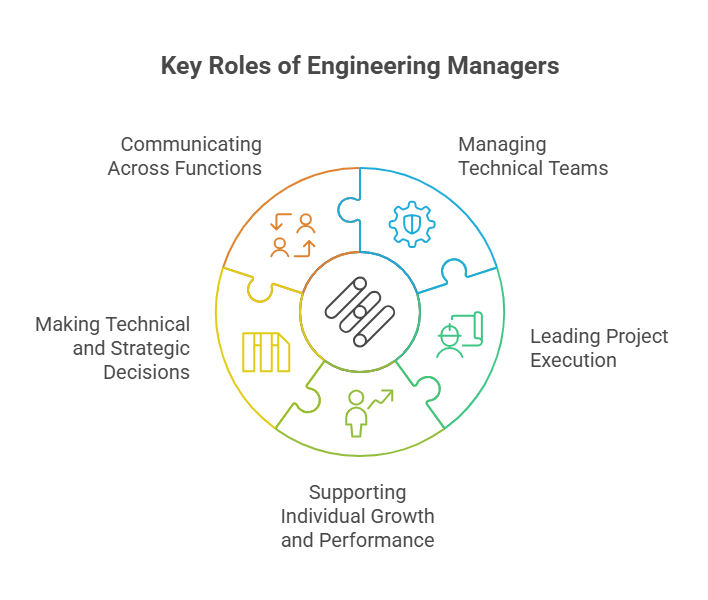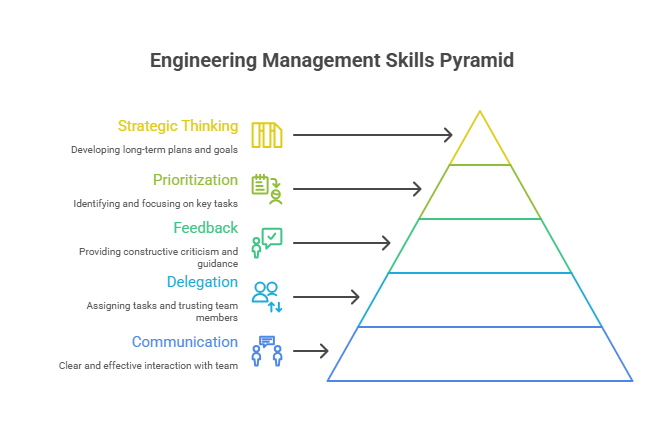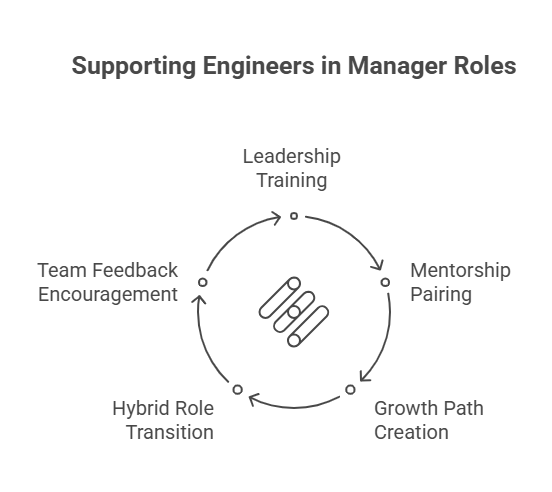More engineers are stepping into management roles but what does that actually mean? Being great at coding doesn’t automatically make someone a great manager. The role shifts from solving problems yourself to helping others do their best work.
This article breaks down the real responsibilities engineers take on as managers. We’ll explain what changes, what skills matter most, and how this role drives team success. If you’re an engineer thinking about management—or already in the role—this will give you a clear picture of what’s expected and how to do it well.
Let’s start with what the role truly involves.
What Is the Role of an Engineer as a Manager?
An engineer who becomes a manager moves from building systems to building teams. The role shifts from writing code to guiding people who do. It’s less about doing the work directly and more about making sure the right work gets done, the right way, by the right people.
The main job is to lead technical teams, set direction, and remove obstacles. That includes managing timelines, helping engineers grow, keeping projects on track, and making sure technical decisions support business goals.
Engineering managers still use their technical background, but as context, not a crutch. They ask better questions, spot risks early, and make faster calls because they understand how systems work. But they don’t need to be the smartest person in the room. They need to build a room where smart people can do their best work.
In short, the role is about people, performance, and product. You lead the team, shape how they work, and make sure the end result moves the company forward.
Core Responsibilities of Engineers in Managerial Positions
When an engineer becomes a manager, the job doesn’t just shift—it expands. The responsibilities stretch across people, projects, and technical direction. Here’s what that actually looks like in practice.

1. Managing Technical Teams
Engineering managers lead teams, not tasks. They set clear goals, help prioritize work, and make sure everyone understands what success looks like. They check in regularly, support their team’s progress, and step in when someone gets stuck.
They’re also responsible for hiring, onboarding, and building a team culture where people can do great work without burning out.
2. Leading Project Execution
Engineering managers are accountable for delivery. That means breaking down large projects into smaller parts, setting realistic timelines, and making sure work moves forward without constant delays or surprises.
They don’t need to write the code, but they do need to understand how long something should take, what might go wrong, and how to adjust plans when it does.
3. Supporting Individual Growth and Performance
A big part of the role is helping engineers grow. That includes giving clear feedback, setting performance expectations, and helping team members develop both technical and soft skills.
It also means handling performance issues early, before they affect the whole team.
4. Making Technical and Strategic Decisions
Engineering managers often act as a filter between technical details and company goals. They help decide which features to prioritize, which tools to adopt, or when to refactor instead of building something new.
They don’t make every decision, but they guide the team to make the right ones faster and with fewer mistakes.
5. Communicating Across Functions
Good engineering managers keep everyone aligned. That means updating product managers on timelines, helping designers understand technical limits, and translating team updates into clear reports for leadership.
They help the team focus by shielding them from noise, and help the company stay focused by sharing what the team needs to succeed.
Why Engineers Are Often Promoted to Management Roles
Engineers often get promoted to management because they already understand the work, the tools, and the people doing it. They’ve built trust within the team and earned respect by solving hard problems. That credibility carries weight when stepping into leadership.
They’re also used to thinking in systems and solving problems under pressure—skills that transfer well into managing timelines, team issues, and product delivery. When something breaks, engineers don’t panic—they debug. That same approach helps them stay calm and think clearly as managers.
Another reason? Companies need managers who can speak both languages: tech and business. Engineers who move into management can translate technical risks into clear priorities for leadership. They help avoid miscommunication and bad calls that slow down progress.
Finally, engineers are often the most natural choice when a growing team needs structure. Instead of bringing in an outside manager with no context, promoting from within keeps momentum and morale high, especially if that person already leads by example.
Skills Engineers Need to Succeed as Managers
Shifting into management means learning new skills that aren’t taught in most technical roles. Here are five key ones every engineer-turned-manager needs to build:

1. Clear Communication
Engineers are used to being precise with code—now they need to be just as clear with people. That includes explaining expectations, giving updates, and adjusting your message depending on who you’re talking to—whether it’s a developer, product manager, or executive.
2. Delegation and Trust
You can’t do everything yourself anymore. Great managers learn to hand off work and let others take ownership, even if it’s not how they’d do it. Trust is built by giving people space to solve problems and backing them up when they need support.
3. Feedback and Coaching
Good feedback is specific, timely, and honest. Managers help their team grow by showing what’s working, what needs to change, and how to improve. That takes empathy, patience, and a willingness to have uncomfortable conversations when needed.
4. Prioritization
As a manager, you’re pulled in ten directions. You need to know what matters most—today, this week, this quarter—and help your team stay focused. That means making trade-offs, saying no, and keeping everyone aligned on the goal.
5. Strategic Thinking
You’re no longer just solving technical problems—you’re helping shape what gets built and why. Strategic thinking means understanding how engineering fits into the bigger picture and making decisions that help the business move forward.
Challenges Engineers Face in Managerial Roles
Becoming a manager isn’t just a title change—it’s a full shift in mindset. Many engineers struggle at first. Here are five common challenges they face in the transition:
1. Letting Go of Coding
One of the hardest adjustments is stepping back from hands-on work. Many new managers feel guilty not writing code or worry they’ll fall behind. But holding onto technical tasks too long takes focus away from leading the team.
2. Redefining Success
As an engineer, success means finishing tasks or solving problems. As a manager, your wins come from your team’s progress, not your own output. That shift can feel uncomfortable at first, especially for high achievers used to personal performance metrics.
3. Managing Former Peers
Leading people you used to work alongside can be awkward. It takes time to establish authority without coming off as bossy or too soft. Clear communication and consistency help build respect without changing who you are.
4. Making Tough People Decisions
Not everything can be solved with logic or code. Managers have to handle conflict, give critical feedback, and sometimes make decisions that affect people’s jobs. These aren’t technical problems—they’re human ones, and they require a different kind of strength.
5. Staying Aligned with Leadership
Managers sit between the team and upper leadership. That means balancing team needs with company goals, even when they don’t match perfectly. It’s not always easy to represent both sides without losing trust on either one.
How Companies Can Support Engineers in Manager Roles
Even the best engineers need support when stepping into management. The role is different enough that expecting them to “figure it out” leads to avoidable mistakes. Here are five ways companies can help them succeed from day one:

1. Provide Leadership Training Early
Engineers often become managers without any real preparation. Offering short, practical leadership workshops—focused on communication, feedback, and decision-making—helps bridge the gap quickly and builds confidence early on.
2. Pair New Managers with Mentors
A mentor who’s been through the same transition can be invaluable. Regular check-ins with an experienced engineering manager give space for questions, real talk, and problem-solving outside the team dynamic.
3. Create a Clear Path for Growth
Management shouldn’t feel like the only option for career progress. Companies need clear parallel tracks—one for engineering leadership, one for technical depth—so people choose based on strengths, not pressure.
4. Ease the Transition with Hybrid Roles
Let engineers try team leadership while still contributing technically. Roles like “Tech Lead” or “Team Lead” allow them to test the waters, develop key skills, and decide if full-time management is a fit, without jumping in too fast.
5. Encourage Feedback from Their Team
New managers grow faster with honest feedback. Anonymous surveys or regular check-ins can help them understand how they’re doing, what’s working, and what needs to change—before small issues grow into real problems.
When Engineering Managers Should Stay Technical—And When They Shouldn’t
Engineering managers often wonder how much coding they should still do. The answer depends on team size, company stage, and their main responsibilities. Here’s how to strike the right balance:
Stay Technical in Smaller or Early-Stage Teams
In startups or small teams, managers often need to pitch in. Writing code, reviewing pull requests, and helping with architecture keep things moving. It also helps build trust if the team knows you can still deliver when needed.
Step Back as the Team Grows
As teams scale, writing code becomes less valuable than removing blockers, aligning people, and making decisions. The more time you spend in the weeds, the less you’re supporting the team’s big-picture progress. At this stage, staying hands-on can create bottlenecks.
Stay Technical Enough to Guide, Not Block
Even if you’re not coding daily, you still need to understand what’s going on. That means staying close to architecture discussions, knowing how the systems work, and asking the right questions. The goal is to stay informed, not to control every detail.
Avoid Using Code as a Comfort Zone
Some managers keep coding because it’s what they know best. But using technical work to avoid leadership responsibilities holds the team back. If you’re managing people, that should be your priority—even if you miss writing code.
Use Your Technical Background to Make Better Calls
You don’t need to be the best engineer on the team, but your background helps you evaluate risks, spot red flags, and guide decisions that balance quality, speed, and impact.
Conclusion
Moving from engineer to manager is less about climbing a ladder and more about shifting your lens. It’s no longer just “How can I solve this?”—it’s “How can I help others solve this better?” That mindset shift is where real leadership begins.
The skills that made you a great engineer—problem-solving, clarity, precision—still matter. But now, they need to show up in your decisions, your communication, and the way you build trust. You’re shaping not just code, but the people and systems behind it.
If you’re stepping into management, don’t wait to feel ready. Start by listening more, being clear about expectations, and asking better questions. You don’t need to have all the answers—you need to create an environment where the team finds them faster, together.
And if you’re a company growing your leadership bench, don’t just promote your best engineers—support them. Management is a skillset, not a reward. Invest in it early, and you’ll build better teams, better products, and a stronger culture that scales.




